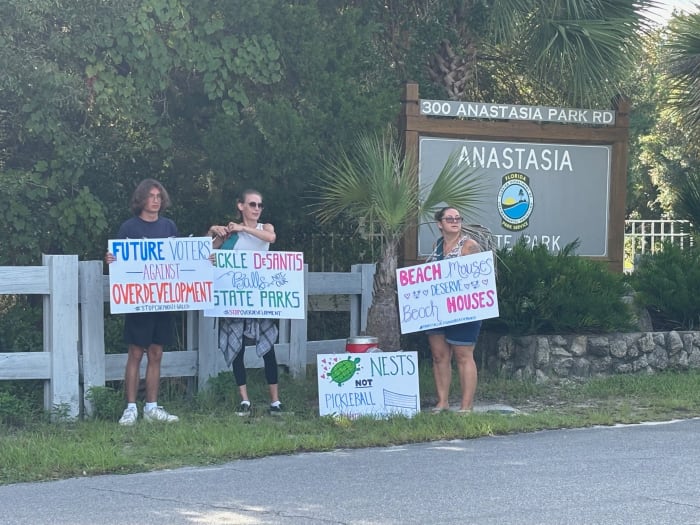North Carolina
Transgender health care restrictions gain steam in North Carolina

RALEIGH, N.C. (AP) — Proposals to ban or to restrict access to gender-affirming health care for transgender youth advanced Wednesday in both chambers of North Carolina’s Republican-controlled General Assembly in the final weeks of the session.
The House voted 66-47 along party lines for a bill prohibiting public health care facilities, such as public hospitals or University of North Carolina affiliates, from performing any surgical gender transition procedure on a minor, or providing them with puberty-blocking drugs or cross-sex hormones. It also prohibits using state funds to pay for gender-transition procedures starting Oct. 1 and removes access to care for trans youth who are already receiving that treatment at a state facility.
Gender-affirming care is considered safe and medically necessary by the leading professional health associations, including the American Academy of Pediatrics, the American Medical Association and the Endocrine Society. While trans minors very rarely receive surgical interventions, they are commonly prescribed drugs to delay puberty and sometimes begin taking hormones before they reach adulthood.
Several Democrats, including Rep. Allison Dahle of Wake County, pleaded with their Republican colleagues to block the bill and stop legislating trans lives.
“Every time this bill comes up, I spend about two hours crying because you’re asking people to change everything about them and abide by your rules,” she said on the House floor.
Pitt County Republican Rep. Timothy Reeder, one of the bill’s sponsors, called it a “common sense” measure that he said will protect children from receiving life-altering treatments before they are old enough to consent to them.
The bill now heads to the Senate, which advanced a more stringent treatment prohibition through a committee earlier Wednesday.
That proposal would ban any health care provider in the state from providing gender-affirming care, including hormone therapy, puberty blockers and surgeries, to anyone under the age of 18. Minors who begin treatment before Oct. 1, when the restrictions take effect, could continue receiving care if the doctor deems it necessary and the parents give consent.
Medical professionals who violate the restrictions could have their licenses revoked under the bill.
It must clear at least two more committees before it reaches the Senate floor and would still need to return to the House for a final concurrence vote before it reaches the governor’s desk.
Democratic Gov. Roy Cooper, who has expressed previously his opposition to bills that target trans youth, has little power to block legislation now that Republicans hold veto-proof majorities in both chambers.
State Republicans have advanced several bills this week that target LGBTQ+ youth, including a ban on trans girls playing on the school sports teams that align with their gender identity, which could receive final approval as soon as Thursday. Another bill that gained momentum Wednesday in the House would limit conversations about gender identity and sexuality in public schools and would require teachers to alert parents before calling their child by a different name or pronoun.
___
Hannah Schoenbaum is a corps member for the Associated Press/Report for America Statehouse News Initiative. Report for America is a nonprofit national service program that places journalists in local newsrooms to report on undercovered issues.

North Carolina
Obituary for Donna Darlene Foy at Jones Funeral Home of Jacksonville

North Carolina
Spotted lanternfly confirmed in western North Carolina

RALEIGH, N.C. (WTVD) — The invasive spotted lanternfly has been confirmed in western North Carolina, the Department of Agriculture and Consumer Services (NCDACS) said.
The department said it confirmed the presence of the insects in Rockingham County after initial surveys indicated that the insects were concentrated in Reidsville within a two mile radius.
“NCDA&CS has ramped up surveillance in the Triad area since this pest was detected in in Kernersville in 2022,” said Dr. Bill Foote, director of the NCDA&CS Plant Industry Division. “Members of our Plant Industry team are moving quickly to assess and prevent the spread of this brightly colored pest, and we ask members of the public to be on the lookout for more spotted lanternfly and report any finds by through a form found at www.ncagr.gov/SLF.”
The insects and their egg masses have been found in 17 states, including North Carolina.
Foote said the spotted lanternfly poses a serious threat to the state’s wine and grape industries and can cause damage to more than 100 species of plants.
“Spotted lanternflies like to feed high in the treetops, but they are not good at telling the difference between a truck tire and a tree trunk,” said Amy Michael, Entomological Programs manager. It is very likely this new population came from lanternflies hopping in with an unsuspecting commuter.”
The NCDACS said concentrated surveys will be performed year-round in Rockingham County to find if the insects are in additional locations.
Officials advise people to look for and destroy lantern eggs before they hatch.
The egg masses can be found on a variety of surfaces including trees, rocks, vehicles, equipment and lawn furniture.
“Taking a moment to check your clothing, shoes and vehicle for these insects and removing any you see goes a long way in preventing this pest from spreading any further,” Michael said.
To learn more about the spotted lanternfly or to report a sighting visit here.
Download the ABC11 App for Breaking News and Weather Alerts
Prevention Tips
According to the USDA’s website, there are some things you can do to prevent and deter the spotted lanternfly from taking over your plants.
- Inspect your trees and plants for signs of this pest, particularly at dusk and at night when the insects tend to gather in large groups on trunks and stems.
- Check your vehicle before leaving a parking lot or work site and inspect vehicles for eggs or insects. Check doors, sides, bumpers, wheel wells, grills, and roofs. If found, destroy any eggs or insects you find.
- Close your car windows as spotted lanternflies and their nymphs can enter vehicles unsuspectedly. When parked, make sure to keep windows closed. If possible, try to park 15 feet away from trees.
- Look for egg masses in your trees, bricks, stones, and other smooth surfaces. If you find eggs, smash them and scrape them into a plastic zippered bag filled with hand sanitizer or rubbing alcohol to kill them. Then, zip the bag shut and dispose of it in the trash.
- During the winter months, check your outdoor items for egg masses, including items you may bring indoors.
Featured video is from a previous report
SEE ALSO | Fire ant season expected to keep pest companies busy in NC
ALSO SEE | NC homeowners encouraged to check now for bats, make repairs to keep them out
Copyright © 2025 WTVD-TV. All Rights Reserved.
North Carolina
GROW NC director defends Helene recovery role, clarifies no direct funds distribution

ASHEVILLE, N.C. (WLOS) — News 13 spoke with the director of the Governor’s Recovery Office for Western North Carolina (GROW NC), Matt Calabria, which is an entity set up by N.C. Governor Josh Stein.
Calabria clarified that GROW NC was created to oversee Helene recovery programs and it does not directly touch any of the funds or distribute them.
“The way GROW NC works is we are a new organization that sits within the Governor’s office that works to accelerate recovery across all the agencies that tries to make sure we identify and resolve right-hand, left-hand problems,” said Calabria. “And make sure we have the most robust effective efficient recovery we possibly can.”
Calabria said GROW NC was established five months ago and is making sure North Carolina agencies do their best to expedite and facilitate recovery funds and that work gets done.
WEATHER WARN DAY ISSUED FOR OVERNIGHT ACROSS WNC, UPSTATE
“We want the work of debris removal to be managed by North Carolina Emergency Management. We want environmental protection work to be done by North Carolina’s Department of Environmental Quality,” said Calabria. “GROW NC oversees the recovery but is not a pass-through for any funds. Funds don’t go to us they go rather to departments.”
On Tuesday, May 20, GROW NC went live with a new recovery fund tracker showing the Helene damage need and allocations on the state and federal levels so far.
“There was about half a billion dollars approved through HB 47 in the March time frame,” said Calabria responding to questions by lawmakers on getting funds out the door,” said Calabria. “And with each one of those, about a dozen line items we worked, as soon as the legislation was passed to issue request for proposals, to make sure whether it be farmers or others had an opportunity to apply to utilize those funds. That’s where those funds are. It’s part of a natural process for distributing those funds. We have to make sure whether it be small governments or others have an opportunity to apply for those funds.”
He said it took a month for the State Office of Budget and Management to “certify” the funds.
State Representative Mark Pless(R-118) said, so far, he’s been disappointed with GROW NC and the work the team has overseen.
GOV. STEIN’S NEW PLAN FOR HELENE RELIEF AIMS TO BOOST SMALL BUSINESSES
“GROW NC is the agency with which the governor’s office has set aside to rebuild Western North Carolina,” said Pless. “They have been up into the mountains, they have spoken with many communities, and they have said, this is who’s going to redo this. We are going to redo this the correct way. But they have still not gotten any of the money out that we gave them in March. It’s all still sitting there. There’s money for housing. There’s money for private roads and bridges; There’s money in there for debris removal. There’s a lot of things we did in March, the money’s just sitting there.”
“There are a number of deadlines coming up,” said Calabria. “That will enable us to start to move those funds out the door, but by and large they tend to be in procurement processes right now, or out for applications, but we hope to get those funds out as quickly as we can.”
Calabria detailed more on appropriations.
“The funds that were appropriated by the State that we were able to move out the door, we have to the greatest extent possible, we have put to work about 80% of the funds that were available to be distributed,” Calabria said. “We’re working through approvals to get the rest of the money out as quickly as possible.”
“The other thing to keep in mind is a lot of appropriations from General Assembly are either contingent on certain triggers or certain requirements being met, or they come in the form of loans and loans are constrained by the demand for those loans,” Calabria said.
Click here to view GROW NC’s Helene recovery fund tracker.
-

 Culture1 week ago
Culture1 week agoBook Review: ‘Original Sin,’ by Jake Tapper and Alex Thompson
-

 News1 week ago
News1 week agoAs Harvard Battles Trump, Its President Will Take a 25% Pay Cut
-

 Education1 week ago
Education1 week agoVideo: Opinion | We Study Fascism, and We’re Leaving the U.S.
-

 News1 week ago
News1 week agoMenendez Brothers Resentenced to Life With Parole, Paving Way for Freedom
-

 Politics1 week ago
Politics1 week agoRepublicans say they're 'out of the loop' on Trump's $400M Qatari plane deal
-

 Technology1 week ago
Technology1 week agoLove, Death, and Robots keeps a good thing going in volume 4
-

 Technology1 week ago
Technology1 week agoMeta’s beef with the press flares at its antitrust trial
-

 Education1 week ago
Education1 week agoA $5 Billion Federal School Voucher Proposal Advances in Congress
















